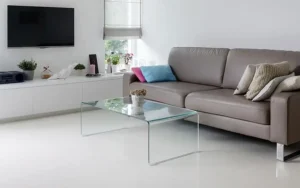If you’re looking to build a wall on a budget, you might be wondering if glass is cheaper than concrete. The answer, of course, depends on a variety of factors. But we can say this: glass walls definitely have a certain je ne sais quoi that concrete walls just can’t match.
Introduction
Glass walls are a popular choice for modern office buildings and homes. But are they really cheaper than traditional concrete walls? Let’s take a closer look at the cost of both types of construction.
Concrete walls are typically more expensive to build than glass walls. The main reason for this is that concrete is a much heavier material than glass, so it requires more time and labor to construct. Additionally, concrete walls need to be reinforced with steel beams or rebar, which adds to the overall cost.
Glass walls, on the other hand, are lighter and easier to work with. They can be constructed quickly and don’t require as much reinforcement. As a result, glass walls usually cost less to build than concrete walls.
So, if you’re looking to save money on your next construction project, you might want to consider using glass instead of concrete.
The benefits of glass walls
Glass walls offer a number of benefits over traditional concrete walls. They are less expensive to construct, they are easier to maintain, and they offer better insulation. Glass walls also let in more natural light, which can help reduce energy costs.
The benefits of concrete walls
There are many benefits to using concrete walls in construction. Concrete is strong and durable, making it an excellent choice for both load-bearing and non-load-bearing walls. Concrete walls also have good sound-blocking properties, which can be beneficial in both residential and commercial settings. In addition, concrete walls are fire resistant and termite proof, making them a safe and low-maintenance option for any building.
The cost of glass walls
The cost of glass walls can vary depending on the type of glass, the size of the wall, and the complexity of the installation. Glass walls can be made from several different types of glass, including tempered glass, laminated glass, and insulated glass. Tempered glass is the strongest type of glass and is often used in high-rise buildings and other structures where safety is a concern. Laminated glass is two or more pieces of glass that are glued together and is often used in areas where security is a concern. Insulated glass is two panes of glass with a space between them that is sealed with air or another gas. This type of glass is often used in homes and office buildings to save energy. The cost of installation can also vary depending on the size and complexity of the project.
The cost of concrete walls
Concrete walls are generally more expensive than glass walls, but there are a few factors that can affect the price. The type of concrete used, the thickness of the wall, and the size of the wall all play a role in the price. In general, concrete walls are more expensive than glass walls, but they offer many benefits that make them worth the extra cost.
The durability of glass walls
Glass walls are not only cheaper than concrete walls, but they are also more durable. Glass is a natural material that is resistant to scratches and other damage, and it does not require regular maintenance like concrete walls do.
The durability of concrete walls
Concrete walls are more durable than glass walls. Glass is prone to breakage and must be replaced more often than concrete.
The aesthetic appeal of glass walls
When it comes to the aesthetic appeal of glass walls, there is no denying that they offer a sleek and modern look that can really add to the overall appeal of any space. In addition, glass walls can also help to create the illusion of more space, which can be particularly beneficial in smaller rooms or areas.












